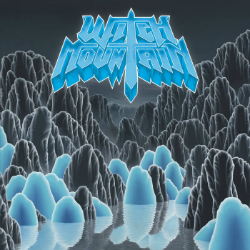 It was a shock when Uta Plotkin left Portland doomsayers Witch Mountain in September of 2014. The vocalist had become nearly synonymous with the group and Profound Lore was on the cusp of releasing Mobile of Angels, the third album with the dynamic singer fronting the band. Although the split was amicable, it seemed to happen right as the band was gaining momentum both commercially as well as critically, and it could have been a crushing blow.
It was a shock when Uta Plotkin left Portland doomsayers Witch Mountain in September of 2014. The vocalist had become nearly synonymous with the group and Profound Lore was on the cusp of releasing Mobile of Angels, the third album with the dynamic singer fronting the band. Although the split was amicable, it seemed to happen right as the band was gaining momentum both commercially as well as critically, and it could have been a crushing blow.
Instead, the band discovered Kayla Dixon in an open audition. What didn’t kill Witch Mountain against all odds made it stronger. Based on this self-titled release (out on Svart Records), a lot stronger.
Dixon has been with the band since not long after the group wrapped up touring commitments with Plotkin, giving the band ample time to introduce her to fans understandably apprehensive about the change, but it also served as a trial by fire. Dixon was only 19 when Witch Mountain plucked her from semi-obscurity. She was a child prodigy trained in classical, jazz and musical theater which incorporated her singing with ballet and contemporary dance. She did spend time with Cleveland brutal Groove Metallers Demons Within, but didn’t seem to record with them.
She has recorded with Witch Mountain before: a truncated version of “Sleeping Village” for a Cleopatra Records Black Sabbath tribute and a 12-inch single featuring her and new bassist Justin Brown on an updated version of “Hare’s Stare” (from the band’s 2011 South of Salem) as the B-side to “Burn You Down,” the first new material with the current lineup.
That song is on the self-titled new album, eponymous most likely because the band could sense that things are different now. The track proves to be a mere appetizer to the rest of the release; in retrospect it seems to be a perfect transition with Dixon’s caterwaul a perfect conduit for the band’s take on classic doom metal.
Her expansive, deep and powerful style allows Witch Mountain to transcend what is commonly referred to as doom metal. “Midnight” sees Portland relocated to a swampy morass where bluesmen make deals with the devil, and in their hands, so do the women done wrong. Like most blues, it’s simple and to the point and allows Rob Wrong to showcase a heavy riff on equal footing as morose soloing as well as Dixon’s voice that alternates between sultry and screaming.
“Mechanical World” allows drummer Nathan Carson to show his chops. The track stops and starts with surprising agility before becoming a mass of searing guitars backed with contrasting gospel vocals. “Hellfire” could be heard around a campfire, with clean guitars leading a sprawling tale of dark folklore that sounds simply stunning as Dixon sings it. The piano makes me think of Judas Priest’s “Epitaph,” which makes me wish Priest never stopped using piano.
Album closer “Nighthawk” is over 14 epic minutes. It burns slowly, smoldering like a flame that is unable to get enough oxygen to fully ignite. It slowly bides its time, gaining in strength, until the band throw open the doors. The rush of oxygen sends it into a four-alarm climax that borrows from the ferocity of death metal and atmosphere of black metal just as much as the band’s patented doom.
With Witch Mountain, the band doesn’t just refine, it reinvents, creating something extraordinary. By catering to Dixon’s vocal range rather than trying to confine it, both the band and the singer move onto what could be described as “R&D,” rhythm and doom. It’s sexy and scary, and it will challenge some who might not be ready for this evolution, but that cloud you see is the dust Witch Mountain is leaving them in.

Your Comments